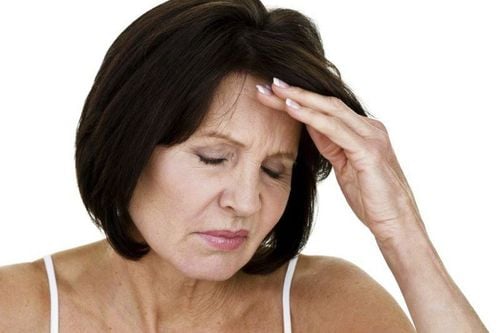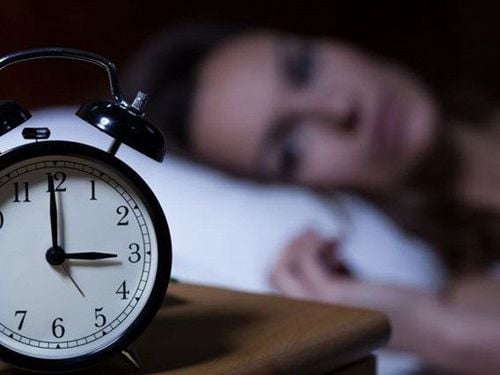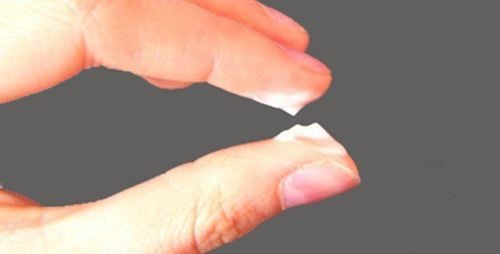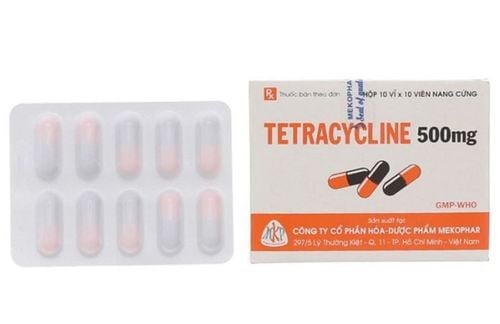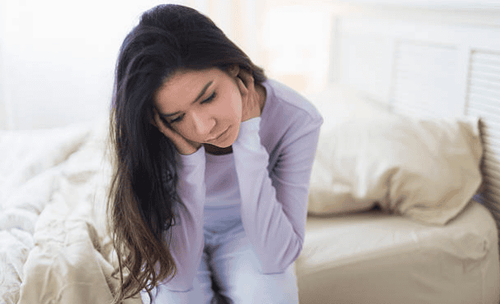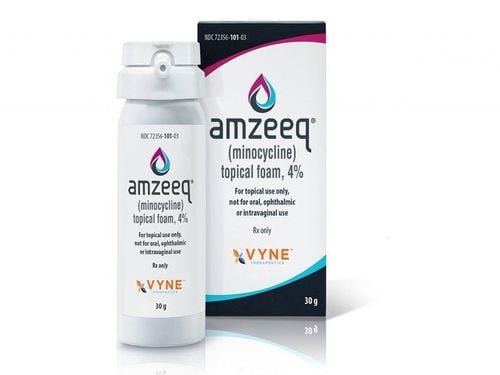This is an automatically translated article.
Hormonal acne is the development of acne related to hormonal changes, which is especially common in women. For women, acne can make them feel insecure, even ashamed, worried and afraid it will leave permanent scars on the skin. Severe acne can even reduce your chances of finding a job in some industries.
1. Why hormonal acne?
Hormonal acne exactly how acne develops is related to hormonal fluctuations in your body. This condition is often related to hormone fluctuations during puberty, which can be seen in both boys and girls. However, hormonal acne can affect adults of all ages.
Hormonal acne is especially common in women. Several factors can contribute to this condition including menstruation and menopause. An estimated 50% of women between the ages of 20 and 29 have acne. And the condition also affects about 25% of women between the ages of 40 and 49.
Some experts say hormones are not generally a factor in adult acne, but a hormonal imbalance can contribute to adult acne.
In other cases, adults with acne may not have any “measurable” hormone problems through tests. This can make diagnosing and treating hormonal acne difficult.
2. Characteristics of hormonal acne
When it comes to puberty, hormonal acne usually appears in the T-zone on the face of both boys and girls. This T-zone includes your forehead, nose, and chin.
Meanwhile, adult hormonal acne usually forms on the lower part of your face, including the bottom of your cheeks and around your jawline.
For some people, hormonal acne takes the form of:
Blackheads Whiteheads Small pimples that grow at the top Cystic acne. Sometimes cysts form deep under the skin and have no head on the surface. To the touch you feel it soft.
Hormonal acne can be caused by hormones associated with the following conditions:
Menstruation Polycystic ovary syndrome Menopause Increased androgen levels Conditions that cause hormone fluctuations can Can aggravate acne problems by increasing:
Overall dermatitis Sebum production in pores Congestion of skin cells in hair follicles Production of acne-causing bacteria - Propionibacterium acnes
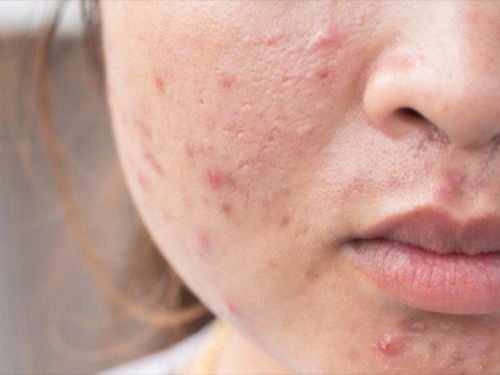
Mụn trứng cá do nội tiết tố đặc biệt phổ biến ở phụ nữ
3. Is menopausal acne a form of hormonal acne?
Many women begin going through menopause in their 40s and 50s. This condition causes a natural decline in their reproductive hormones, leading to the end of menstruation.
There are some women who still have acne during menopause. This could be due to a drop in estrogen levels or an increase in androgen hormones like testosterone in their bodies.
You can still experience acne during menopause even if you are using hormone replacement therapy (HRT) to ease menopausal symptoms. This is because this method uses a stream of the hormone progestin to replace the estrogen and progesterone your body loses. When this hormone is introduced into the body, it can cause your skin to break out.
Prescription drugs can clear up acne in women during menopause. In some cases, it is possible to clear acne in menopause with natural methods.
4. Traditional method of treating hormonal acne
Over-the-counter medications are usually only effective in treating mild hormonal acne. In more severe cases, these drugs have almost no effect. Because hormonal acne often takes the form of cystic acne. These bumps form deep under the skin, outside the range of most topical medications.
Oral drugs will work from the inside out to balance hormones and brighten the skin. Common options include:
Birth control pills (which regulate female hormones) Anti-androgens 4.1. Use of Female Hormone Regulators for Hormonal Acne Dermatologists have used hormone regulators to treat acne in women for decades. However, to date only three drugs have been approved by the FDA to treat acne.
Treatment of acne with hormonal drugs is usually recommended for healthy women who are in need of contraception. This method is often used after other acne treatments, such as topical creams and oral antibiotics, have not cleared up the acne.
4.1.1. How do female hormone-regulating drugs treat acne? As everyone knows, there is a clear relationship between sex hormones and acne. Some women experience perimenopause with flare-ups of acne as their hormone levels change during their menstrual cycle. And for some people, acne persists for years, even after menopause.
Acne is triggered by the overproduction of sebaceous glands. Sebum is made by glands in your skin. Along with skin cells, sebum can clog pores and promote the growth of acne-causing bacteria. Androgens, a group of hormones that include testosterone, stimulate the skin to produce sebum.
Women's ovaries and adrenal glands normally produce low amounts of androgens. Higher levels of androgens can lead to excess sebum. Taking birth control pills that contain both estrogen and progesterone reduces the amount of androgens in your body. This leads to less sebum production in the body and less severe acne.
4.1.2. Hormonal Pills for Acne To date, only three oral contraceptives have been approved by the FDA for the treatment of acne. All three are "combination" birth control pills that contain both estrogen and progesterone. In fact, progesterone-only birth control pills can actually make acne worse.
Every birth control pill used for acne contains a low dose of the same form of estrogen. But each uses a different form of progesterone.
Female hormone regulators specifically used to treat acne contain ethinyl estradiol plus one of the following:
Drospirenone Norgestimate Norethindrone These ingredients work together to target hormones that can cause acne. This can be especially helpful during periods of high hormones such as during ovulation.
The FDA has approved the following female hormone drugs for the treatment of acne, they include:
Ortho Tri-Cyclen is a medicine that uses estrogen in combination with a progestin called norgestimate. The drug is produced in the form of tablets with different levels of progestin. Estrostep is a medication that uses estrogen in combination with a progestin called norethindrone. The drug is produced in the form of tablets with different levels of estrogen. YAZ is a medication that uses estrogen in combination with a man-made form of progestin called drospirenone. The FDA has concluded that birth control pills containing drospirenone may increase the risk of blood clots compared with other progestin-containing medicines. Studies have not shown a big difference between these three drugs in terms of how effective they are in treating acne.
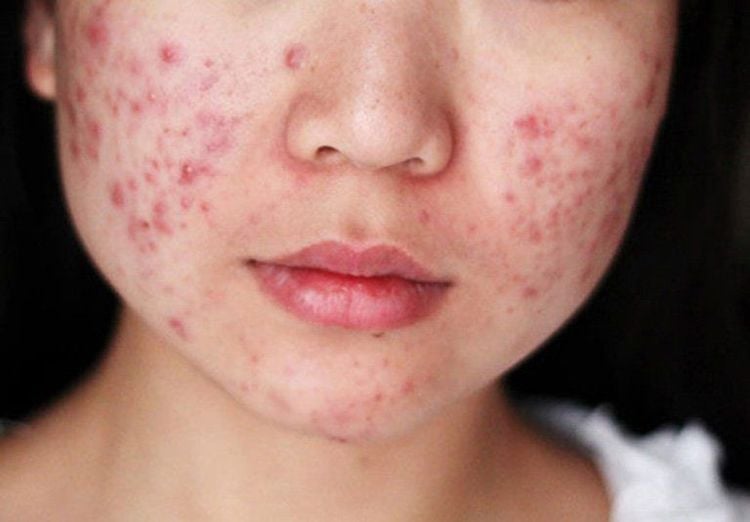
Mụn trứng cá do nội tiết tố có thể được gây ra bởi các hormone
4.1.3. Treatment of mild-to-severe acne with female hormones The three female hormones listed above have been approved for the treatment of moderate acne in women:
Age 14 - 15 years or older Have started menstruating Are in need of birth control In fact, doctors prescribe hormone-regulating pills for most types of acne, from mild to severe.
In addition, your doctor may prescribe other birth control products to treat acne. For example, the birth control pills Yasmin and Alesse have both been clinically proven to improve acne. But neither of these are FDA-approved for this use.
If you are taking a birth control pill that works well in treating acne, you do not need to change. But if you're using birth control pills for acne for the first time, it's best to use one of the three currently FDA-approved medications to treat acne.
You may need to take hormonal medication for a few months, then your skin will start to clear up. And at first, more acne often occurs when women are just starting to take hormonal drugs.
Female hormone regulation drugs only work to reduce excess sebum. Therefore, doctors often prescribe hormonal drugs along with topical medications or antibiotics for the best results in treating acne.
If you have severe acne with irregular periods, and you have a lot of facial hair or are obese, your doctor may run tests to see if you have polycystic ovary syndrome or an internal condition. other hormones or not.
4.1.4. Benefits of using female hormones for acne Some clinical trials have shown that taking female hormones for acne has the following effects:
Reduce flare-ups Fewer acne breakouts More Reducing Inflammation Less severe acne Many women with severe acne need hormonal medications in combination with other acne treatments. For women who are trying to avoid pregnancy, oral contraceptives are also one of the most reliable forms of birth control, as long as they are taken exactly as directed.
4.1.5. Risks of taking female hormone pills for acne Today's female hormone regulators contain lower doses of estrogen and progesterone than in the past. This has greatly reduced the medical risk to the patient. However, women taking birth control pills have a higher risk of side effects, including:
Heart attack Stroke Blood clots in the legs or lungs. Other risks include:
High blood pressure and other heart problems. Liver and gallbladder disease Migraine Depression and mood swings 4.1.6. Who should avoid taking hormonal drugs for acne Some medical conditions can be made worse if you use hormonal drugs. Birth control pills are not generally recommended if you have any of the following:
History of heart disease, high blood pressure, blood clots in the legs or lungs Blood clotting disorders History of cancer: especially breast cancer, uterine cancer or liver cancer. Liver disease, diabetes or migraine You also shouldn't take a female hormone pill for acne if:
You are over 30 years old and are a smoker You are currently pregnant or breastfeeding You are severely obese 4.1 .7. Tips for using hormonal pills for acne Here are tips to get the most benefit from treating your acne with hormonal drugs:
Continue other acne treatments prescribed by a doctor. Hormonal medications only target part of the acne problem. Make sure to follow the exact birth control pill schedule. Doing so will be for your maximum benefit and safety. Talk to your doctor about the possible side effects of birth control pills you're using. These may include: breast tenderness, headache, sudden bleeding, or increased breakouts. Tell your doctor about all the medicines you are taking. Some medications can interfere with the effectiveness of birth control pills and lead to an unwanted pregnancy. Taking certain birth control pills along with oral rifampicin (an antibiotic) can cause you to use a backup form of birth control.
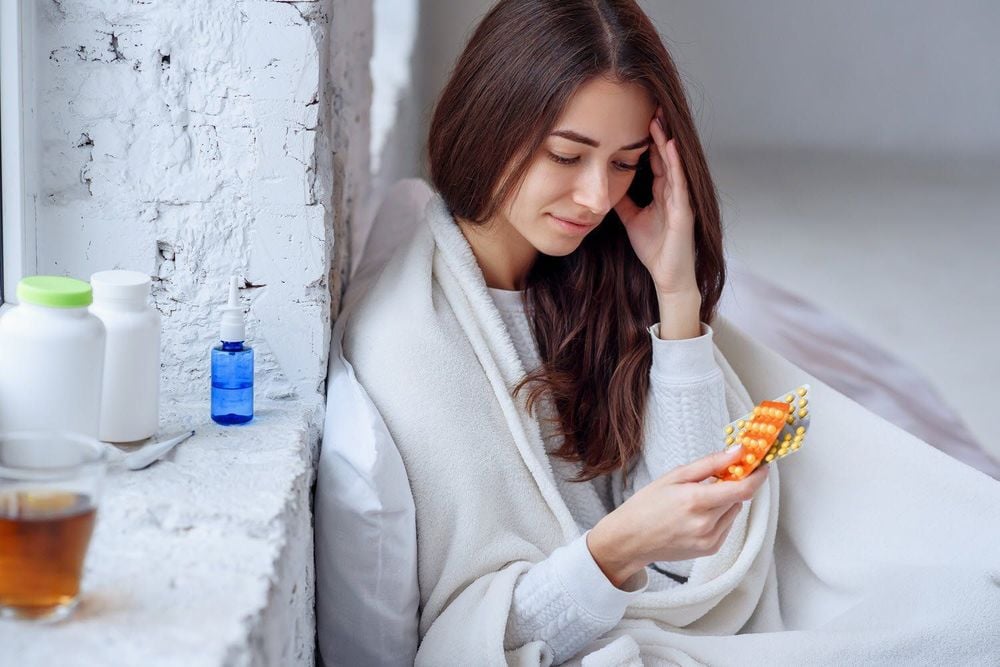
Nhiều phụ nữ bị mụn trứng cá nặng cần dùng thuốc nội tiết kết hợp với các phương pháp điều trị mụn trứng cá khác
4.2. Anti-androgen Drugs Anti-androgen drugs reduce the male hormone androgen. This hormone is present in both men and women in different concentrations. However, having too much androgen can contribute to acne problems by acting on hair follicles and increasing sebum production.
Although the drug Spironolactone (Aldactone) is mainly used to treat high blood pressure, it has an anti-androgen effect. In other words, it can prevent your body from producing more androgens and allow your hormone levels to stabilize.
4.3. Retinoids If your hormonal acne is mild, you can use topical retinoids. Retinoids are derived from vitamin A.
Many retinoid creams and gels are available over-the-counter. But you may want to see your doctor for options that are right for your own acne condition. Choosing a prescription product is often the most effective way to keep your skin clear.
If you add a topical retinoid to your acne regimen, it's important that you apply sunscreen daily. Because retinoids can increase the risk of sunburn.
5. How to treat hormonal acne naturally
In some cases, natural treatments can be used to clear up mild hormonal acne.
Natural acne treatments are usually free of side effects. But they may not be as effective as you expect. Talk to your doctor about the potential risks and to make sure these natural remedies won't interact with any medications you're taking.
Natural methods of treating acne include:
Tea tree oil: tea tree oil works by reducing inflammation - a process that can contribute to acne. One finding indicated that 5% tea tree oil reduced symptoms in participants with mild to moderate acne. Tea tree oil is available in many skin care products, such as cleansers and toners. You can also use tea tree oil as a topical treatment.
You should always dilute tea tree oil with a carrier oil before using it. Common carrier oils include coconut oil, jojoba oil, and olive oil. A general rule of thumb is to add about 12 drops of a carrier oil to every one to two drops of pure essential oil.
It is important that you check to see if your body reacts to this oil. To do this, apply the diluted oil to the inside of your forearm. If you don't feel any irritation or inflammation within 24 hours, you can safely apply it on your face.
Alpha hydroxy acid (AHA): this is a plant acid derived mainly from citrus fruits. Alpha hydroxy acids can help remove excess dead skin cells that clog pores. Additionally, alpha hydroxy acids can help minimize the appearance of acne scars. AHAs can be found in many masks and creams. As with retinoids, alpha hydroxy acids can increase your skin's sensitivity to the sun. You should wear sunscreen when using products with AHAs.
Green Tea: Green tea is known to reduce inflammation in the body. For a more holistic approach, consider drinking several cups of green tea a day alongside your topical skin care regimen. Creams and gels containing at least 2% green tea extract may be beneficial for your acne treatment.

Các phương pháp điều trị mụn trứng cá tự nhiên thường không có tác dụng phụ
6. Hormonal acne: What should and shouldn't be eaten?
The exact role between diet and hormonal acne is still not fully understood. Certain foods can help prevent acne — especially anti-inflammatory foods.
Plant foods are often high in antioxidants that can help reduce inflammation and help brighten skin. Omega-3 fatty acids may also reduce skin inflammation.
Contrary to popular belief, junk food does not cause acne. But overdoing junk food can lead to increased inflammation.
You might consider limiting the following products:
Sugar Dairy products Refined carbohydrates such as: pasta and white bread. Red meat 7. What else to do to clear up hormonal acne?
To clear up hormonal acne and prevent it, you need to have a consistent skin care routine. You should do the following:
Wash your face in the morning and evening thoroughly. Do not apply too much of any acne product. Using too much of any acne product can dry out your skin and increase irritation. Apply sunscreen every day. To reduce the risk of clogging your pores, use only hypoallergenic products. While the exact timing of hormonal acne varies from person to person, proactive prevention can help reduce it. Usually, it takes about 8 to 10 weeks for acne treatment to be effective.
If your acne continues, talk to a dermatologist for a suitable treatment plan. They can change your current treatment and combine different treatments to get the most out of it.
To examine and treat dermatological problems, you can go to Dermatology Specialist - Vinmec International General Hospital. A team of doctors and nurses with high expertise in the treatment of skin diseases, possessing the most modern equipment in the world equivalent to hospitals in the US, Germany, UK, Japan, Singapore to help support medical examination and treatment. , diagnose and treat skin diseases effectively.
In addition, Vinmec stands out with professional consulting services, polite space, and 5-star standard rooms that will help you experience the perfect space. In addition, examination costs are clearly specified for each price bracket. Help patients feel secure when choosing, not expensive.
Please dial HOTLINE for more information or register for an appointment HERE. Download MyVinmec app to make appointments faster and to manage your bookings easily.
Reference source: healthline.com; webmd.com



